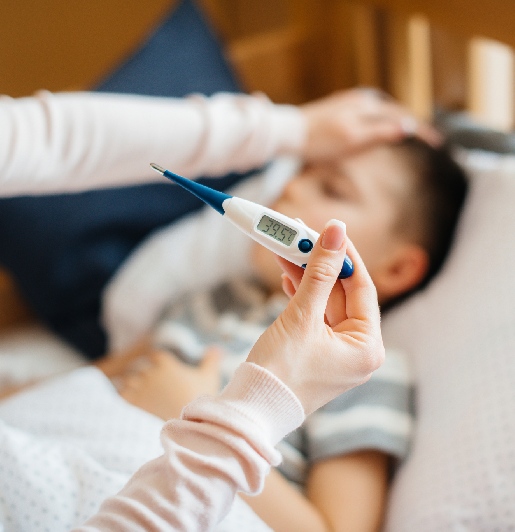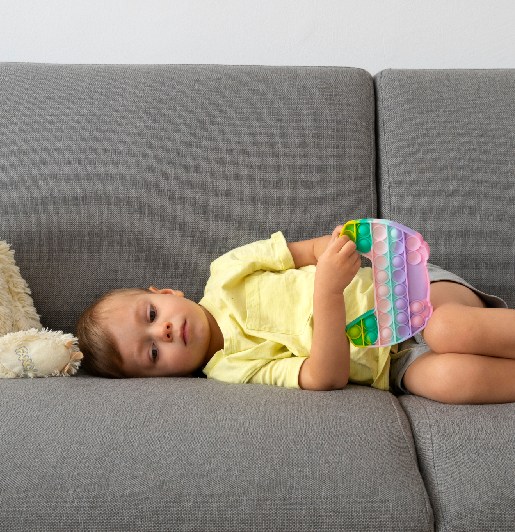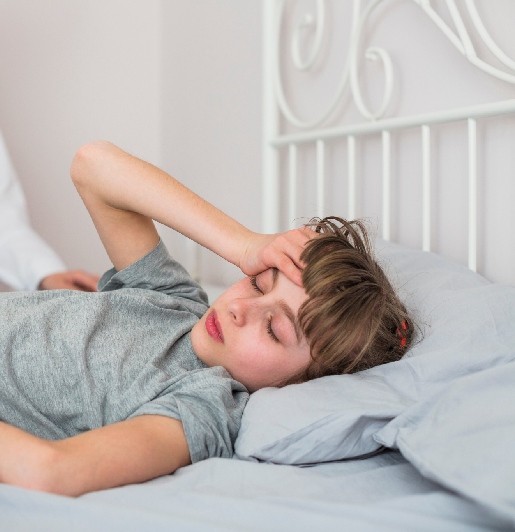Fevers are common in children and often manageable at home, but sometimes they signal a more serious condition. This guide helps you understand fever in children and recognize alarming signs that may need immediate medical attention, ensuring your child gets prompt care.

A fever occurs when the body’s temperature rises above its normal range. In children, a fever is generally considered to be a temperature of 100.4°F (38°C) or higher when measured rectally. It is a common response to infections as the body fights off invading bacteria or viruses
Children with fevers may not be as active or talkative as usual. They might appear fussier, less hungry, or thirstier. Symptoms can include:
While fevers are common, certain symptoms indicate the need for immediate medical attention. Contact your child’s physician immediately if your child exhibits any of the following:
If your child is younger than 3 months and has a rectal temperature of 100.4°F (38°C) or higher, seek immediate medical attention. Young infants can be particularly vulnerable to infections and may require prompt evaluation by a pediatrician.

It’s crucial to recognize alarming signs in your child’s health. These signs can indicate serious illnesses that require immediate medical attention.
Hard tummy or lump in the belly: This can indicate a serious condition like intussusception or a bowel obstruction.
Persistent diarrhea and/or vomiting: These symptoms can lead to severe dehydration and may be a sign of an infection or gastrointestinal issue.
Stool mixed with blood and mucus: This can be a symptom of a severe infection or inflammatory condition like intussusception.
Extreme lethargy and unusual paleness: These signs can indicate severe dehydration, anemia, or other serious.
Signs of panic or shock: Look for rapid breathing, a racing heart, or extreme anxiety, which can signal a severe medical condition.
Ensure your child stays hydrated. Offer water or herbal tea regularly, especially when they are awake.
Use TV or other distractions to see if your child’s condition improves or if they remain in distress.
Watch for ongoing symptoms like vomiting and diarrhea. If they persist or worsen, it could lead to severe dehydration or indicate a more serious condition.
This condition involves the intestines and requires urgent care. Look for severe abdominal pain, vomiting, and jelly-like stools.
Sharp abdominal pain, especially on the right side, is a key sign. Immediate medical evaluation is crucial as this condition can quickly become life-threatening.

To keep your child comfortable while managing a fever at home, consider these tips:
• Keep the child hydrated with plenty of fluids.
• Dress them in lightweight clothing and use a light blanket if they feel cold.
• Keep the room temperature cool and use a fan if needed.
• Encourage rest.
Over-the-counter medications like paracetamol or ibuprofen can help reduce fever and alleviate discomfort. Always follow the dosage recommendations on the label and consult your child’s physician if you have any concerns about medication use.

Febrile seizures are convulsions triggered by fever in young children. They typically occur in children between 6 months and 5 years old and can be alarming, but they are usually harmless and do not cause long-term health issues.
• Lay them on their side on a flat surface to prevent choking.
• Do not put anything in their mouth.
• Stay with your child and time the seizure.
• Call inmediately 112/061
Teething may cause a slight increase in temperature but not a true fever. If your child has a high fever, look for other causes.
Generally, it is not necessary to wake a sleeping child to give fever medicine unless instructed by a physician.
Take your child to the emergency room if they exhibit any alarming signs listed above or if you are unable to reach your physician and are concerned about their condition.
If you are worried about your child’s fever or any symptoms, do not hesitate to contact your pediatrician. Prompt evaluation and care can ensure your child’s health and well-being.
Remember, if you have any concerns about your child’s condition, always consult your child’s physician for a diagnosis and appropriate medical advice.
If your child shows any of the alarming signs mentioned above, call 112 or visit our 24/7 emergency room at Teknon Clinic without delay. Immediate medical attention is essential.
Centro Médico Teknon
Carrer de Vilana, 12
Office 150. First Floor.
Torre Vilana.
(+34) 933 933 150
office@drfaustinstitute.com
Monday to Friday:
9:00 AM – 2:00 PM
Monday & Wednesday:
3:00 PM – 7:30 PM
C/Marquesa de Villalonga
Call 061 or 112
CONSULTA 150 DATA PROTECTION INFORMATION
Purposes: To respond to your requests and send you commercial information on our products and services including via email. Rights: You may withdraw your consent at any time and access, rectify, delete your data and exercise other rights at consulta150@delegado-datos.com
Additional information: Privacy Policy.